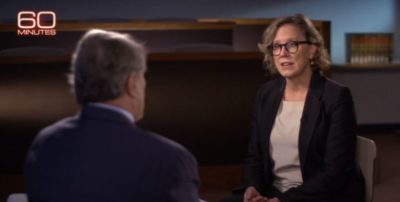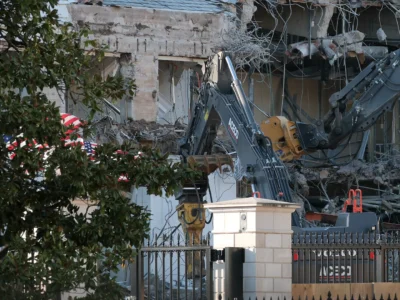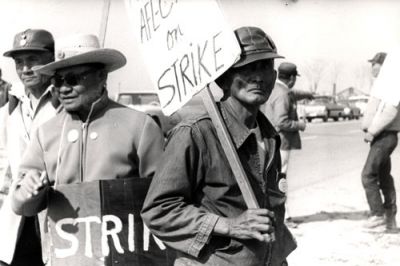UCLA Law’s Ann Carlson Interviewed on CBS’s 60 Minutes Discussing Juliana v. U.S., Landmark Climate Change Lawsuit
Segment Provides Legal Context for Groundbreaking Children’s Climate Case
 Our colleague Ann Carlson appeared on 60 Minutes this past Sunday for a lengthy on-camera interview with Steve Kroft, discussing the Juliana v. U.S. lawsuit filed by Our Children’s Trust. Begun in 2015, the lawsuit has survived several appeals so far, and is headed to oral arguments in June at the U.S. Court of Appeals for the Ninth Circuit in Portland, Oregon.
Our colleague Ann Carlson appeared on 60 Minutes this past Sunday for a lengthy on-camera interview with Steve Kroft, discussing the Juliana v. U.S. lawsuit filed by Our Children’s Trust. Begun in 2015, the lawsuit has survived several appeals so far, and is headed to oral arguments in June at the U.S. Court of Appeals for the Ninth Circuit in Portland, Oregon.
Juliana v. U.S. is significant because, if the plaintiffs secure a victory, the federal courts could compel the U.S. government to take action to reduce greenhouse gas emissions, an obligation the federal government has so far resisted to act on at the scale and speed deemed necessary by scientists. As Ann points out in the interview, federal courts have asked the government to take on big tasks before – Brown v. Board of Education is an example – but this children’s climate case could force a government response unprecedented in scope.
Ann, Rick Frank, and Dan Farber have posted extensively about this case before. Last year, U.S. District Court Judge Ann Aiken ordered the trial to go forward in this landmark case, in which youth plaintiffs assert that the federal government has an “atmospheric trust”-based obligation to take action to reduce emissions of the greenhouse gases that cause climate change. The Trump administration is using all possible legal tools to stop the case in its tracks, and petitioned the U.S. Supreme Court to halt proceedings late last year. (To be fair, the Obama administration also strongly opposed the case, which is unsurprising given the significant power the plaintiffs’ argument would give a federal district court over U.S. climate policy.) The case’s novel legal theory and compelling youth plaintiffs have attracted much public attention, especially in the time since Judge Aiken issued her groundbreaking opinion allowing the case to go forward early on in the litigation, surprising many observers.
After two trips to the U.S. Supreme Court, the case has returned to the Ninth Circuit for that court to hear an interlocutory appeal of Judge Aiken’s order allowing the case to go to trial. (Interlocutory appeal means an appeal of an interim order that doesn’t resolve the case, in this case Judge Aiken’s decision to deny the Trump Administration’s motions for summary judgment and judgment on the pleadings and instead to order that the case go forward.) Parties don’t have a right to appeal interlocutory orders, but courts may allow those appeals; here, Judge Aiken certified her order for appeal after the Supreme Court signaled strongly its belief that the case met the standard for interlocutory appeal, that the case “involves a controlling question of law as to which there is substantial ground for difference of opinion and that an immediate appeal . . . may materially advance the ultimate termination of the litigation.” Many observers interpreted that comment from the Court as a bad sign for the litigation’s future, but at present the case is in the Ninth Circuit’s hands to determine whether the case should go to trial. Briefing is underway in that appeal now, and a wide range of organizations and people have weighed in with friend-of-the-court briefs supporting the plaintiffs’ claims.
Ann’s analysis in her interview is appropriately cautious. She points out that she, along with most other observers, was highly skeptical of the plaintiffs’ legal theory, and at the same time she notes the strongest thing about the case: the compelling nature of climate change as an existential risk and the failure of our institutions to address it, in the face of a mountain of evidence that the problem was posing this risk. Plaintiffs’ attorney Julia Olson was also interviewed; her demeanor on camera is confident as she explains her view that if the case goes to trial, the government won’t be able to effectively justify inaction in the face of the evidence. While the segment does not cover the legal hurdles that the Supreme Court’s review has signaled so far (with a majority-conservative bench, the prospects of this case in the Supreme Court are uphill to say the least, even if the plaintiffs go to trial and win), the segment provides the general public and observers of U.S. climate policy a useful overview of the legal issues at play in Juliana v. U.S.







Reader Comments